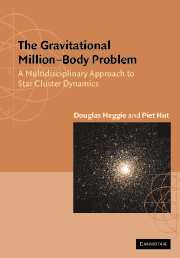Book contents
- Frontmatter
- Contents
- Preface
- PART I INTRODUCTIONS
- PART II THE CONTINUUM LIMIT: N → ∞
- PART III MEAN FIELD DYNAMICS: N = 106
- PART IV MICROPHYSICS: N = 2
- 13 Exponential Orbit Instability
- 14 Two-Body Relaxation
- 15 From Kepler to Kustaanheimo
- PART V GRAVOTHERMODYNAMICS: N = 106
- PART VI GRAVITATIONAL SCATTERING: N = 3
- PART VII PRIMORDIAL BINARIES: N = 4
- PART VIII POST-COLLAPSE EVOLUTION: N = 106
- PART IX STAR CLUSTER ECOLOGY
- Appendix A A Simple N-Body Integrator
- Appendix B Hints to Solution of Problems
- References
- Index
13 - Exponential Orbit Instability
Published online by Cambridge University Press: 05 June 2012
- Frontmatter
- Contents
- Preface
- PART I INTRODUCTIONS
- PART II THE CONTINUUM LIMIT: N → ∞
- PART III MEAN FIELD DYNAMICS: N = 106
- PART IV MICROPHYSICS: N = 2
- 13 Exponential Orbit Instability
- 14 Two-Body Relaxation
- 15 From Kepler to Kustaanheimo
- PART V GRAVOTHERMODYNAMICS: N = 106
- PART VI GRAVITATIONAL SCATTERING: N = 3
- PART VII PRIMORDIAL BINARIES: N = 4
- PART VIII POST-COLLAPSE EVOLUTION: N = 106
- PART IX STAR CLUSTER ECOLOGY
- Appendix A A Simple N-Body Integrator
- Appendix B Hints to Solution of Problems
- References
- Index
Summary
Up to this point in the book we have largely turned our back on the microscopic character of the million-body problem. Usually we have approximated the gravitational field by that of a smooth distribution of matter. Now we concentrate on the interactions between small numbers of stars in the system, often only two or three stars at a time. In later parts of the book we shall see how these microscopic processes influence the large-scale behaviour.
The purpose of this chapter is to look at the question of sensitivity to initial conditions in the million-body problem. Much current research in other dynamical problems is devoted to this question, because of its importance for prediction, for the foundations of statistical mechanics, and perhaps even for the survival of life on Earth. What lies behind this remark is the fact that the question of sensitivity is linked to stability, and the stability of the solar system is something we rely on implicitly. But the collision of comet Shoemaker–Levy with Jupiter in 1994 reminded us that the solar system is not the well regulated clock we often take it for. Less well known is the recent realisation that the rotation of the Earth (which itself influences climate strongly) appears to be stabilised by the presence of the Moon (see Laskar 1996).
Consider the one-body problem. The star proceeds with uniform rectilinear motion r1(t). Another single star, not interacting with the first, and starting with a similar initial velocity and position, exhibits similar motion r2(t).
- Type
- Chapter
- Information
- The Gravitational Million–Body ProblemA Multidisciplinary Approach to Star Cluster Dynamics, pp. 120 - 127Publisher: Cambridge University PressPrint publication year: 2003



